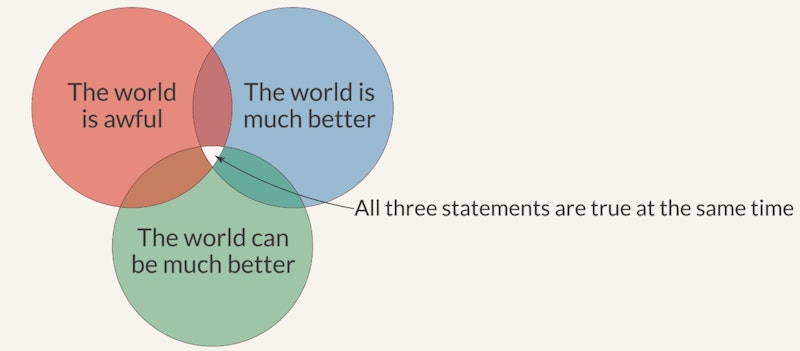In the News
Hopeful Geographies 4: Women in Data & Women's Health

23rd January 2024
Data is the lifeblood of geography at A-level. I have to confess to a girl crush on @_HannahRitchie who is Deputy Editor of Our World in Data and if you’re not following her Substack can I suggest you do? Sustainability by numbers is a blog about ‘using data and research to understand what really makes a difference’. She namechecks Gapminder's Founder Hans Rosling in today's post and in my mind I have had her in the same basket as Hans for a while, given her daily efforts to share good news stories, with fantastic data visualisations - just like this one.
One of humanity's greatest achievements is stopping women from dying in childbirth.
— Hannah Ritchie (@_HannahRitchie) December 28, 2023
Maternal death rates (per 100,000 births) in the generations that came before me:
Mum: 6
Grandma: 27
Great-grandma: 300
Great-great-grandma: 450 pic.twitter.com/Sjt6AEMbr0
Women in data:
Why not focus in on the plight of the world's women in motherhood as a data-rich topic? Our World in Data have here.
Women in data science:
But back to hope more generally, Hannah’s 23 January 2024 Sustainability by numbers post provides us with 5 reasons why we might highlight stories of progress. Rather than trying to summarise her well illustrated arguments here, I’ll just list her 5 reasons and let you read the full text instead.
Progress creates the momentum for more positive change
It helps us see that the seemingly unachievable, isn’t
Past progress is full of lessons that can improve things today
Pointing out successes puts pressure on leaders to deliver the same (or more)
To solve problems we need to move forward, not backward
The link to Hannah Ritchie’s Substack is in her bio on X/Twitter.
Ritchie is also alive to the need for a balance to be struck between progress and complacency, when we talk about hope - as mentioned by Jenny Pickerill in her 2023 GA Conference lecture about hope in Geography at undergraduate level (summarised briefly here in my first blog in this series).
Ritchie has also recorded a useful TED talk Are we the last generation or the first sustainable one? which is worth a watch with students.
Shout out to @MaxCRoser, Founder of Our World in Data and creator of this super useful illustration to stick in the corner of your white board, which you can download from his article entitled The world is awful... here.

Women's health:
Maternal death rate is a current case in point where the truth is that the world is 'much better', 'awful' and 'can be much better' simultaneously.
It is clear from the graph shared at the top of this post that UK maternal death rates are so much lower than in the past. However, this story from The Guardian earlier this month highlights that the number of UK women who die during pregnancy has, in fact, risen sharply in recent years. In 2020-2022, it rose to 13.41 deaths per 100,00 pregnancies, from 8.79 in 2017-2019 (2020-2022’s rate is the highest since 2003-05 of 13.95 per 100,000). So things could still be much better and complacency about mothers' health and well being was a specific problem during the pandemic, we might conclude.
Clearly the loss of any single mother is tragic wherever it occurs in the world, but Sierra Leone in West Africa has a devastatingly high maternal death rate, where an estimated 1 in 80 pregnancies ends in the death of the mother. But there is still hope. In their review of maternal death rate data the Our World in Data team note,
‘...if we can make maternal deaths as rare as they are in the healthiest countries we can save almost 300 000 mothers each year [globally]’.
Talking of mothers (and grandmothers), I have said it before but this is a wonderful TED talk from Hans Rosling about The Magic Washing Machine, which I used to finish Year 9 with, especially for those not joining me for the journey through GCSE the following autumn.
Students of the Population & the environment topic (an option on Paper 2, AQA A-Level) need to know about the impact of malaria vaccines - read the story of the first vaccine's impact in Science here. Further good news can be found in the update from Scotland that no cases of cervical cancer in women vaccinated at 12 or 13 years of age demonstrates the effectiveness of the HPV vaccine in the UK. A great couple of fillips to leave you on!
You might also like

3 great simulation games for geography lessons
2nd February 2016

Help Your Team - Have a Pee
16th December 2015
Marine protected area to be created off Scotland
9th June 2019

Can e-bikes transform our cities?
8th August 2022

Geography in the News: New malaria vaccine is world-changing
8th September 2022

The 15-minute city
28th February 2023